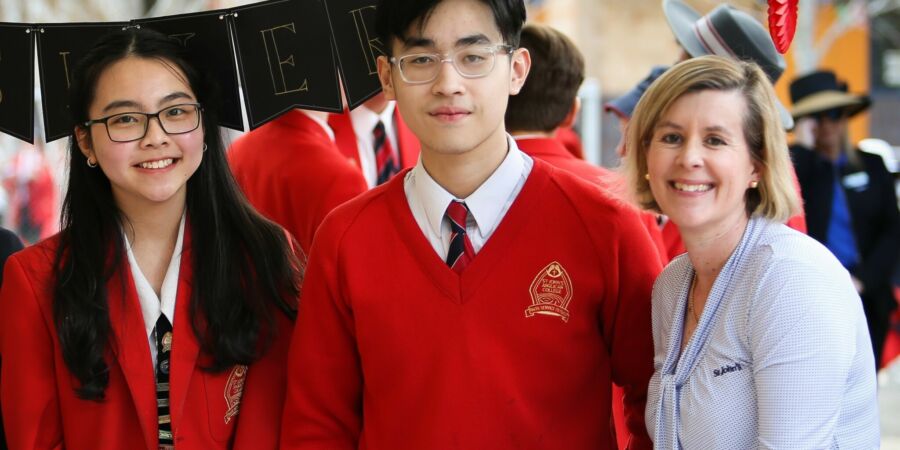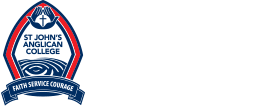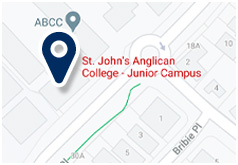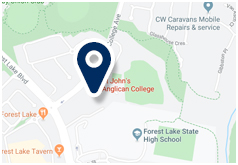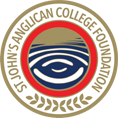International College
The Australian education system is one of the best in the world with Brisbane being a great city in which to study.
Studying in Australia is a wonderful experience for international students and at St John’s we provide a strong and supportive community of students, teachers and parents who will care about your child. The personal well being of international students is ensured through their involvement in physical education, personal development, outdoor education programs under the guidance of caring and supportive teachers and their homestay family.
Our teachers are experienced in educating students from overseas. They will get to know your child’s strengths and direct their learning into our Senior Pathways Program in preparation for University and beyond.
At St John’s we welcome opportunities to engage with our international student community and we value highly the impact this interaction can have on learning for domestic students. Developing student’s awareness of cultural diversity, global issues and opportunities is an important foundation for young people’s active participation in modern society.
Courses
| Junior School - Alpine Place, Forest Lake – Full Time Courses | |
|---|---|
| CRICOS Code 054871F | Junior School Studies (Prep-Year 3) (Duration: 208 weeks) |
| CRICOS Code 084815K | Junior School Studies (Years 4-6) (Duration: 156 weeks) |
| Secondary School – College Avenue, Forest Lake – Full Time Courses | |
|---|---|
| CRICOS Code 093155M | Secondary School Prep Program Level 1 – 5 (Duration: 66 weeks) |
| CRICOS Code 084816J | Secondary Studies (Years 7-10) (Duration: 208 weeks) |
| CRICOS Code 077491F | Senior Secondary Studies (QCE) Years 11 – 12 (Duration: 104 weeks) |
Secondary School Preparation Program Level 1 – level 5
Our programs provide international students with the opportunity to study intensive high school preparation courses before commencing school.
These courses are designed for students who have studied English as a Second Language (ESL) in their home country but wish to reach the academic entry standards required to join mainstream secondary school classes at St John’s Anglican College. We also assist students to develop language and cultural skills to allow for a smooth transition to mainstream schooling. A minimum one year of study of English (or equivalent) in the student’s home country is required before acceptance.
Curriculum
Level 1: Beginning English
Listening – Comprehend short utterances spoken carefully, clearly and very slowly on autobiographical or personal topics
Speaking – Exchange very basic information on very familiar topics and can, at times, contribute very short, simple ideas in classroom interactions
Reading – Comprehend very short, very simple written texts on familiar topics
Writing – Write very short, simple texts with basic personal information; and is beginning to write simple, short text-types for general school purposes after extensive teacher modelling
Maths – Understanding Numbers. Time (analogue and digital), Australian Currency. Basic Geometry. Measurement (using metric units). Basic Operations of addition, subtraction, multiplication, division. Prime, composite and index forms. Bar charts and interpretation.
Science – Measurement and Fair Test experiments. Using senses (animal/plant study including habitats). Natural disasters/weather. Read, write and speak about what is inside things.
Level 2: Becoming familiar with English, and orientation to learning through English
Listening – Comprehend basic short utterances spoken carefully, clearly and slowly on familiar and taught topics
Speaking – Exchange very basic information on familiar topics and can contribute short, simple ideas in classroom interactions
Reading – Comprehend short, straight-forward written texts on familiar topics
Writing – Write very short, simple texts for personal and social purposes on familiar topics; and is beginning to write simple, short text-types for general school purposes after teacher modelling
Maths – Understanding Numbers. Time (analogue and digital), Australian Currency. Basic Geometry. Measurement (using metric units). Basic Operations of addition, subtraction, multiplication, division. Prime, composite and index forms. Bar charts and interpretation.
Science – Write very short, simple texts with basic personal information; and is beginning to write simple, short text-types for general school purposes after extensive teacher modelling
Level 3: Post-beginning English/moving into learning through English
Listening – Comprehend a basic range of short utterances spoken carefully and clearly on familiar topics and basic school topics
Speaking – Exchange basic information on familiar topics and can contribute simple ideas in classroom interactions
Reading – Comprehend a range of short, straight-forward written texts on familiar topics including short, simple mainstream text extracts
Writing – Write a range of basic short, simple texts for personal and social purposes on familiar topics; and is beginning to write a number of simple, short text-types for general school purposes with some accuracy
Maths – Advanced use of Place value. Order of Operations. Problem solving using all 4 operations. Directed numbers including Cartesian plane, gradient and intercept. Money Maths (percentages, discount, profit, best buy, simple interest, commission and applications). Algebra rules and its application. Geometry rules and its application. Basic probability.
Science – Laboratory safety, naming of equipment and use of. Conduct chemistry /physics experiments safely in small groups. Microscopic work including cells and their specialization and perform a dissection relating to human body systems. Study of skeletal, digestive, nervous and circulatory systems of the human body. Prepare a Multi-modal presentation (Topic: Cells)
Level 4: Becoming confident in English and in learning through English
Listening – Comprehend a range of short and moderately extended utterances spoken carefully on familiar and school topics
Speaking – Exchange a range of information on familiar topics and can contribute at times in the academic classroom
Reading – Comprehend a range of short and moderately extended written texts on familiar topics including straight-forward mainstream text extracts
Writing – Write a range of simple texts for personal and social purposes; and is beginning to write a number of text-types for general school purposes with some accuracy
Maths – Ratio and its application. Perimeter, area and surface area of basic shapes and its application. Volume and its application to include 3D sphere. Trigonometry and compass bearings. Algebra and further applications (linear equations/graphing, simultaneous equations, basic quadratics and Venn Diagrams).
Science – Safety in the laboratory and using chemicals and equipment, Language of understanding science. Safety, signs and symbols. Elements and the Periodic Table. Compounds and chemical reactions, Valence and writing formula and balancing equations. Writing scientific reports from laboratory experiments. Newtons Laws, Energy and Change (Simple and Compound Machines).
Level 5: Transition towards successful learning through English.
Listening – Comprehend a range of short and extended utterances spoken at a normal rate on familiar and school topics
Speaking – Exchange a wide range of information on familiar topics and a growing range of spoken language in the academic classroom
Reading – Comprehend a range of short and extended written texts on familiar topics including mainstream texts
Writing – Write a range of texts for personal and social purposes, as well as a basic range of text-types required for general school purposes with a growing level of precision and detail
Maths – Use statistical knowledge and formulae in excel to create and analyse and describe a variety of graphs. To research, write and present information in a detailed report from a survey using random sampling methods. Use, make, describe and analyse box plots so as to compare two pieces of data. Other extended math topics included are number systems, circle geometry, linear equations and algebra techniques.
Science – Goal setting. Verbal and nonverbal communication. Study of the environment including excel graph analysis. Language of graphs to enable using PEEL paragraph writing. Pond cycle analysis and the effect of pollution and other factors on the abiotic and biotic components within the environment. Chemistry study of acids and bases and an acid rain analysis. Scientific processes include a notion, hypothesis, theory, law and principle. Read, write, analyze and review using high school science texts from the Queensland Curriculum. Gas Laws and graph interpretation. Compare and contrast, keys and flow diagrams. Analysis of scientific diagrams and cartoons and current global issues both in written and verbal presentations.
Teaching and Learning
Highly qualified and experienced teachers make St John’s International College an ideal place for learning the English language. Teachers hold TESOL (Teachers of English to Speakers of Other Languages) and secondary school teaching qualifications and are trained in preparing international students for high academic performance.
A blend of ESL and mainstream teaching methods and techniques allows students to experience a self-paced learning environment. Students are also taught a range of study skills and support to take responsibility for their own learning and progress. Class sizes are kept small, with an average of 15 students per class. This provides students with the best possible learning environment.
International Student Support Services
Our students’ care and wellbeing are one of the main priorities at St John’s Anglican College and St John’s International College.
Support and assistance are offered by our dedicated and caring staff to students experiencing any personal or academic difficulties during their stay. Students are encouraged to contact members of staff to discuss their concerns. At St John’s the following staff are available to meet with students:
- Head of St John’s International College
- Homestay Coordinator
- Deputy Principal – Pastoral Care
- College Counsellor
- College Chaplain

